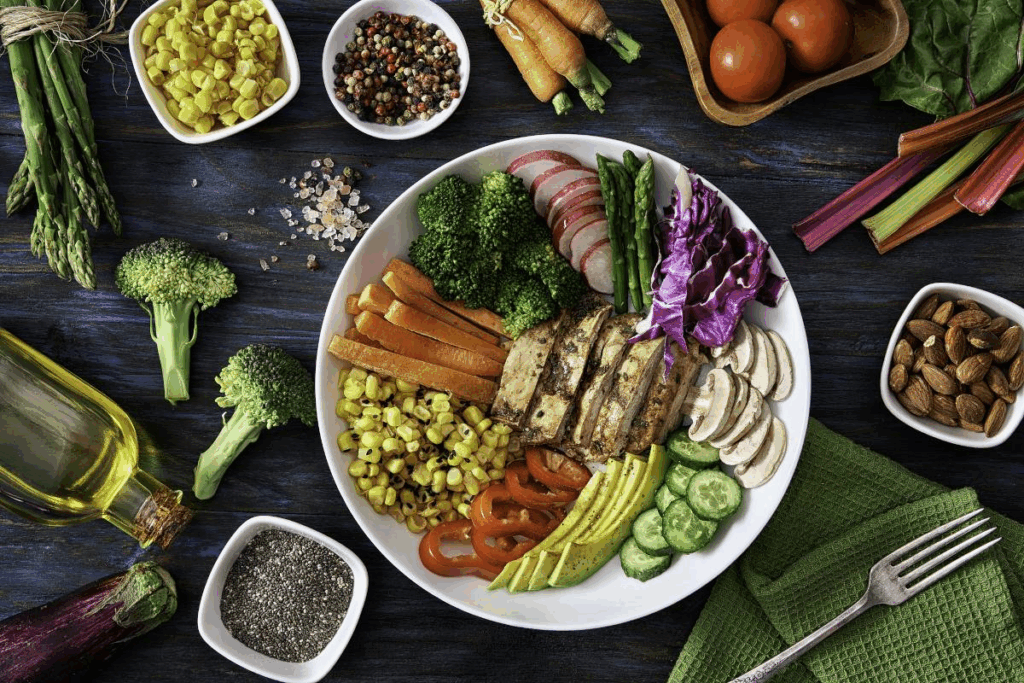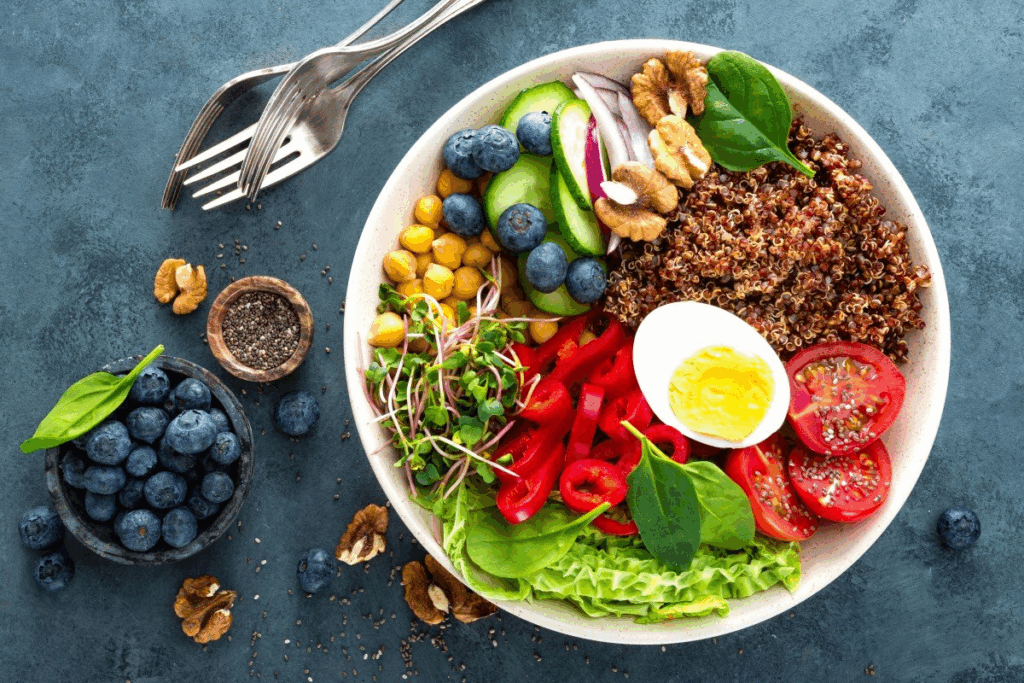
Choosing to have gastric sleeve surgery is a big step. Eating right is key to getting better and staying healthy. At Liv Hospital, we know how important a good gastric sleeve diet is for lasting health.Get 10 essential tips for your VSG post op diet. This guide covers both pre- and post-surgery rules for guaranteed success.
After surgery, your journey is just starting. A good pre-op diet for VSG and post-op diet helps avoid problems and helps you lose weight well.
We’ll show you the best diet tips before and after surgery. Our team is here to help you every step of the way. We’re all about making your VSG journey smooth and successful.

To get the best results from VSG surgery, knowing how nutrition affects your health is key. We know that proper nutrition is essential before and after VSG surgery. It helps with healing and prevents problems.
VSG surgery changes your digestive system by making your stomach smaller. This affects how your body breaks down food. A balanced gastric sleeve pre-surgery diet and diet plan after surgery can improve nutrient absorption.
With a smaller stomach, you’ll need to change how you eat. You should focus on foods rich in nutrients. You might also need to take supplements, as your doctor suggests.
Proper nutrition before and after VSG surgery is very important. A well-nourished body can handle surgery better and recover faster. Studies show that following dietary guidelines lowers surgery risks and helps keep weight off.
Before surgery, a sleeve gastrectomy pre op diet prepares your body. It makes your liver smaller and improves your health. After surgery, a well-planned pre-VSG diet and diet plan ensure you get the nutrients you need for healing and long-term health.
Understanding the role of nutrition in gastric sleeve success helps you prepare for a successful VSG journey. We’re here to help you with expert advice and support.

It’s very important to stick to your pre-operative gastric sleeve diet closely. This diet, lasting 2-3 weeks, is a key part of your journey. It helps prepare you for surgery and makes recovery smoother.
The pre-surgery diet timeline gets your body ready for the surgery. It lasts from 2 to 3 weeks. You’ll eat low-calorie, high-protein meals strictly. This helps reduce fat around your liver and belly, making surgery safer and possibly quicker.
A main goal of the pre-op gastric sleeve diet is to make your liver smaller. A smaller liver makes it easier for surgeons to reach your stomach. This reduces surgery risks. Following this diet helps ensure your surgery goes well.
To get the most out of your pre-surgery diet, avoid certain foods. Stay away from:
By cutting out these foods, you help shrink your liver and reduce belly fat. This makes your surgery safer and could help you recover faster.
By sticking to your pre-op gastric sleeve diet, you’re doing a lot to help your surgery succeed. This prep not only improves your surgery results but also helps you start a healthier life after surgery.
After gastric sleeve surgery, patients must follow a specific diet progression. This is to ensure proper healing and avoid complications. The VSG post-op diet is designed to support the body’s recovery and help patients adjust to their new stomach.
We guide our patients through a four-phase diet progression. It starts with clear liquids and gradually introduces more substantial foods over several weeks. This structured approach is key to a successful recovery and long-term weight loss.
The first phase focuses on clear liquids. These are easy on the stomach and help prevent dehydration. Examples include water, clear broths, and electrolyte-rich beverages like sports drinks. It’s important to sip slowly and avoid using straws to minimize swallowing air.
As the body heals, patients move to full liquids. This includes thicker, more calorie-rich options like protein shakes and pureed soups. This phase is critical for meeting nutritional needs while being gentle on the stomach.
In the third phase, patients start eating pureed foods. These foods are blended to a smooth consistency, making them easy to swallow and digest. Examples include pureed vegetables, fruits, and lean proteins.
In the final phase before returning to regular foods, patients eat soft, moist foods that are cut into small pieces. This phase helps the stomach adjust to more substantial foods while being mindful of the reduced stomach size.
Understanding and following this VSG post-op diet progression is vital for a smooth recovery and to minimize complications. Our team is committed to supporting patients throughout this journey. We provide guidance and care every step of the way.
Getting enough protein is key after a VSG surgery. It helps your body heal and keep muscle. Eating enough protein is vital for fixing tissues and keeping muscle mass during weight loss.
To heal and keep muscle, aim for 60 grams of protein a day. This amount can change based on your health, how active you are, and your surgery’s guidelines.
To hit this goal, add high-protein foods to your meals. Lean meats, fish, eggs, and dairy are great for protein. For instance, a chicken breast can give you about 30 grams of protein.
| Food Item | Protein Content per Serving |
| Chicken Breast | 30 grams |
| Lean Beef | 26 grams |
| Fish (Salmon) | 20 grams |
| Eggs | 6 grams per egg |
| Greek Yogurt | 20 grams |
What protein you eat changes as you recover. Start with liquid or pureed proteins, then move to softer foods, and eventually solid ones.
Protein supplements are helpful early on when eating solid foods is hard. They help meet your daily protein needs.
Choose supplements that are low in sugar, rich in amino acids, and fit your diet. Always talk to your doctor or a nutritionist to pick the right one for you.
Focus on protein and make smart choices about your sources and supplements. This helps your body heal and keeps muscle, leading to a successful recovery and better health in the long run.
Drinking enough water is key after gastric sleeve surgery. It helps your body heal and keeps you healthy. Staying hydrated is important to avoid problems after surgery.
It can be hard to drink enough water right after surgery. To meet the goal of 64+ ounces a day, sip water slowly all day. Use a hydration tracker or phone reminders to stay on track.
Tips to Increase Hydration:
It’s important to wait 30 minutes after eating before drinking. This rule helps your stomach digest food better. It also lowers the chance of problems.
| Timing | Action |
| Before Meals | Wait 30 minutes before drinking fluids |
| After Meals | Wait 30 minutes before drinking fluids |
While water is best, other drinks can also help. Low-sugar sports drinks, herbal teas, and diluted fruit juices are good choices. Just pick drinks that are low in sugar and calories to help with weight loss.
Creating good hydration habits is important for your health after VSG surgery. Aim for at least 64 ounces of fluid a day. Try different drinks to make staying hydrated fun and interesting.
After VSG surgery, knowing common diet mistakes is key. We’ll show you how to avoid them. This way, you can stay on track and get the best results.
Drinks with carbonation are a big no-no after VSG surgery. They can cause gas pain and discomfort. Avoid drinks like soda, sparkling water, and beer. They can make gas build up in your stomach, causing pain.
Studies say avoiding these drinks is important to avoid complications. Stick to non-carbonated fluids like water, unsweetened tea, or diluted fruit juices.
Eating too much sugar after VSG surgery can cause dumping syndrome. This includes symptoms like nausea, vomiting, diarrhea, and stomach cramps. Limit sugary foods and drinks to avoid dumping syndrome and keep your weight loss on track.
“Dumping syndrome is a common complication after gastric sleeve surgery, often caused by consuming high-sugar or high-fat foods. By being mindful of your diet, you can minimize the risk of this condition and ensure a smooth recovery.”
Drinking alcohol after VSG surgery needs careful thought. We suggest avoiding alcohol for at least six months after surgery. It can cause nutritional deficiencies, dehydration, and other problems. If you do drink, do it in moderation and know the risks.
| Alcohol Type | Potential Risks |
| Beer | Carbonation can cause discomfort and gas pain |
| Mixed Drinks | High sugar content can lead to dumping syndrome |
| Spirits | Can cause dehydration and nutritional deficiencies |
Constantly snacking, or grazing, can ruin your weight loss efforts. Instead, eat balanced, nutrient-rich meals at set times. This supports your health and weight loss goals.
By avoiding these common diet pitfalls, you can prevent complications and ensure a successful recovery. Our team is here to support you every step of the way.
Getting the right vitamins and minerals is key after gastric sleeve surgery. Patients may face nutritional deficiencies due to their smaller stomach and changed digestion. We’ll help you find the best supplements, when to take them, and how to keep track of your nutrition.
After surgery, your body needs more nutrients than food alone can provide. Multivitamins, calcium, vitamin D, and vitamin B12 are must-haves. Always talk to your doctor about the right supplements for you.
The kind and amount of supplements you need can change. For example, some people might need iron to avoid anemia.
When you take your supplements is just as important as what you take. We suggest taking them at times that won’t clash with meals or meds. For instance, calcium and iron shouldn’t be taken together because they can compete for absorption.
It’s best to spread out your supplements throughout the day. This keeps your nutrient levels steady and reduces side effects.
Keeping an eye on nutritional deficiencies is vital after VSG. We check your levels regularly for vitamin B12, iron, and more through blood tests.
Catching deficiencies early helps avoid bigger health problems. Your team will tell you how often to get tested and how to adjust your supplements based on the results.
Understanding the role of vitamins and minerals is key to a healthy recovery after VSG. Our team is here to offer personalized advice and support every step of the way.
After VSG surgery, many patients face digestive issues. These can affect their recovery and health. We’ll help you manage these problems with effective strategies.
Nausea and food intolerances are common after VSG surgery. Eating small, frequent meals helps. Clear liquids and bland foods are good in the early stages. If nausea lasts, talk to your doctor about diet changes.
Constipation is common after VSG surgery. It’s caused by diet changes, less activity, or pain meds. To avoid it, drink lots of water and slowly add more fiber. Regular exercise, as allowed by your doctor, helps too. If you get constipated, ask your doctor about laxatives or other treatments.
Some digestive issues are normal after VSG surgery. But severe pain, constant vomiting, or dehydration need quick doctor visits. Watching how your body reacts and getting medical help when needed is key to a smooth recovery.
Weight loss after VSG surgery is just the start. You need a plan for long-term eating habits. Think about how you’ll keep your weight off and stay healthy.
Creating a lasting meal plan is key after VSG surgery. Aim for regular, balanced meals all day. Eat three main meals and one or two snacks to keep your energy up and hunger down.
Key elements of a sustainable meal structure include:
After VSG surgery, controlling portions is critical. Use smaller plates and bowls to gauge your food. Measuring with a food scale or cups helps too, at first.
Effective portion control tips include:
It’s important to balance your macronutrients for health and weight loss. Focus on protein to keep your muscles strong. Aim for 60 grams of protein daily, spread across your meals.
A balanced macronutrient distribution might look like this:
| Macronutrient | Recommended Daily Intake |
| Protein | 60-80 grams |
| Fat | 20-30% of total daily calories |
| Carbohydrates | 40-50% of total daily calories |
By focusing on a sustainable meal plan, portion control, and balanced macronutrients, you can achieve long-term health and weight loss after VSG surgery. We’re here to guide and support you through this important phase.
Changing your diet is just part of the journey after VSG surgery. It’s a big step towards a healthier life. It’s not just about changing what you eat, but also how you think about food and eating. Studies show that mental readiness helps patients adjust better and recover faster.
Mindful eating means paying attention to your food and eating experience. It’s about enjoying each bite and listening to your body’s hunger and fullness signals. This practice can help you develop a healthier relationship with food and reduce the likelihood of overeating. Try eating without distractions like TV or your phone. Focus on the taste, texture, and smell of your food.
Being mindful helps you enjoy your food more and feel satisfied with smaller portions. This is key after VSG surgery.
Many people eat emotionally, using food to cope with stress or anxiety. After VSG surgery, it’s vital to tackle these patterns. Identifying your emotional triggers and finding alternative coping strategies, such as meditation, exercise, or talking to a friend, can be very helpful. Seeking help from a therapist or counselor is a good idea to find healthier ways to cope.
Your environment affects your ability to follow your new eating habits. Creating a supportive environment involves stocking your kitchen with healthy foods, avoiding situations that trigger unhealthy eating, and surrounding yourself with people who support your lifestyle changes. Share your goals and progress with a friend or family member. Ask for their support. Also, joining a support group for VSG patients can offer valuable connections and resources.
A successful VSG journey starts with good nutrition, before and after surgery. Following the dietary guidelines in this article can lower surgery risks and help with weight loss. Studies show that those who stick to nutrition plans do better and recover faster.
Starting a VSG journey can seem scary, but with the right nutrition, you’re on the right path. Our team is here to offer full support and guidance. We make sure you get the care you need for a successful VSG outcome. Nutrition after VSG is key to your health and weight loss goals.
By following our tips and guidelines, you’re taking charge of your health. We’re committed to helping you every step of the way. With the right nutrition and care, you can have a successful VSG outcome and live a healthier, happier life.
The diet before VSG surgery lasts 2-3 weeks. You’ll eat low-calorie, high-protein meals. This helps shrink your liver and reduce fat, making surgery safer.
Avoid foods high in sugar, fat, and calories before VSG surgery. Also, skip carbonated drinks and foods that upset your stomach or cause digestive problems.
After VSG surgery, your diet goes through four phases. First, you’ll have clear liquids for 2 days. Then, full liquids for 11 days. Next, pureed foods for 3 weeks. Lastly, soft foods for 5 weeks. You’ll gradually move to more solid foods over time.
Aim for at least 60 grams of protein daily after surgery. Focus on protein-rich foods and supplements to help with healing and muscle preservation.
Avoid carbonated drinks, high-sugar foods, and grazing after surgery. These can cause discomfort, digestive issues, and slow down weight loss.
Yes, taking vitamins and minerals is key after VSG surgery. It helps prevent deficiencies and supports your health. Always follow your healthcare provider’s advice.
Manage nausea and digestive issues by eating small, frequent meals. Avoid foods that trigger problems. Stay hydrated. If symptoms don’t improve, contact your healthcare provider.
You can start long-term eating around 6-8 weeks after surgery. Focus on creating a sustainable meal plan, controlling portions, and balancing nutrients for your health.
Prepare mentally by practicing mindful eating and addressing emotional eating. Build a supportive environment to help you maintain a healthy relationship with food.
Hydration is vital after surgery to keep you healthy and prevent dehydration. Drink at least 64 ounces of fluid daily, following the 30-minute rule to avoid mixing food and fluids.
It’s best to avoid high-sugar foods like ice cream after surgery. They can cause discomfort and slow down weight loss. Always check with your healthcare provider for personalized advice.
The gastric sleeve pre-op diet lasts 2-3 weeks before surgery. It includes low-calorie, high-protein meals to prepare your body for surgery and aid in recovery.
The diet before sleeve gastrectomy is similar to the gastric sleeve pre-op diet. It lasts 2-3 weeks and focuses on low-calorie, high-protein meals to reduce surgical risks and support recovery.
Bettini, S., et al. (2020). Diet approach before and after bariatric surgery. Nutrients. https://www.ncbi.nlm.nih.gov/pmc/articles/PMC7455579
Subscribe to our e-newsletter to stay informed about the latest innovations in the world of health and exclusive offers!
WhatsApp us